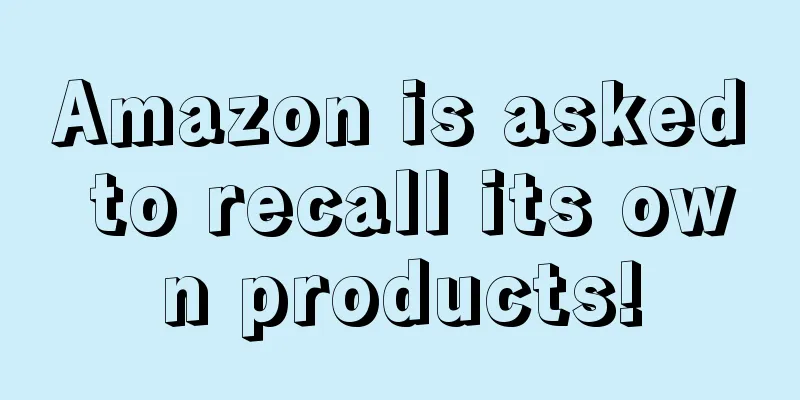Amazon is asked to recall its own products!

|
Amazon has made considerable profits from its self-operated business by leveraging its platform advantages, using third-party sellers’ data to select products, and pushing suppliers to lower prices. However, antitrust agencies in various countries have long been eyeing Amazon’s self-operated business. Last week, Japan’s antitrust agency forced Amazon to return tens of millions of dollars in payments to suppliers. Recently, foreign media uncovered a piece of dirty secret about Amazon’s own products . This time, not only the antitrust agency, but even government officials came forward to demand a full recall by Amazon! This time it was revealed that "Amazon Basics" had serious spontaneous combustion problems. In foreign media investigation reports, dozens of products of this brand were reported and complained by a large number of consumers about problems such as spontaneous combustion, melting, and even fire. Foreign media have also counted the website data of AmazonBasics, among which more than 1,500 reviews mentioned problems such as "danger" and "fire", and even more than half of the reviews asked Amazon to recall these problematic products. Some buyers whose products caught fire received official refunds after contacting Amazon, and some consumers whose homes were damaged by fires caused by electrical appliances also received compensation. However, almost all of these problematic products have not been removed from the shelves and are still being sold on Amazon. After this problem was exposed by foreign media, it attracted the attention of the government and Amazon. Several Democratic senators jointly wrote to my brother-in-law, demanding that Amazon must immediately stop selling these potentially defective products and warn buyers. Amazon must immediately stop selling dangerous and defective AmazonBasics products, recall them, and promptly and effectively notify consumers of these potential risks. It is not enough to simply remove the retail listing pages for the products and leave them inactive. There is no reason why Amazon should not immediately notify purchasers of these products of the consumer safety issue. An Amazon spokesperson also quickly came out to explain, but the content of the speech was a bit evasive, and did not mention the recall and suspension of sales of products at all. It simply said, "We have taken many steps to ensure the safety and high quality of Amazon Basics products, such as selecting experienced manufacturers, monitoring customer feedback and testing projects to ensure that they pass safety and compliance standards before and after they are on the market." Although Amazon has denied it, it has quietly removed several products involved in the incident. When you open the links to these products again, you can only see the distorted pages, and there is no explanation of the reason for the removal. Amazon Basics is one of the most famous self-operated brands. The incident was a huge blow to Amazon. And it’s not just a self-ignition scandal. The focus on Amazon’s own products will also expose the monopoly position of its own business. The twists and turns of self-operated products In this survey conducted by foreign media, it was mentioned intentionally or unintentionally that even with such a huge safety hazard, customers also responded to the problem in their comments. However, Amazon Basics products still occupy the best search display position, and sales remain high. This is also a manifestation of Amazon using its platform advantages to tilt traffic and policies towards its own brands. The report also cited an example of a power bank to prove Amazon's "preference" for its own products. This power bank product, which has only been on the market for a few months and has only a dozen reviews , was displayed higher in the search results than the Anker product with tens of thousands of reviews. This practice of supporting self-operated products is itself suspected of monopoly, not to mention that the products favored are self-operated products that may have safety risks. Showing one's own defective products to buyers and suppressing the safe products of third-party sellers is even more unacceptable. Currently, buyers and governments are still criticizing Amazon for not removing its own products from the shelves despite having problems with them. However, it is estimated that they will soon notice Amazon's algorithmic bias. So although Amazon has not responded directly, there will definitely be some adjustments to its self-operated algorithms in the near future to avoid the limelight. It may even reduce the display of self-operated products to a certain extent, which can be regarded as a small positive in the short term. Without the competition from self-operated stores, everyone will have less pressure to rank higher in the near future, and the results may be better than usual. We should take advantage of this opportunity to lay a good foundation for Prime Day. |
<<: Primeday news! Multi-channel date analysis
>>: Amazon traffic surges! How to achieve huge sales during the peak season?
Recommend
What abilities do Amazon employees over 30 need to advance to senior operations?
In Amazon's recruitment information, we can al...
What is MerchantRun? MerchantRun Review
MerchantRun is a fast-growing online retail soluti...
What is a good Chinese seller? Chinese Good Seller Review
China Good Sellers is a valuable opportunity for h...
What is Zazzle? Zazzle Review
Zazzle is a marketplace for custom products where ...
What is Prestozon? Prestozon Review
Prestozon is an Amazon PPC management service that...
13 ways to find product ideas and create new hits
There are more and more sellers on Amazon, with an...
The epidemic in the United States has exploded again! Sellers' logistics are blocked and FBA inventory capacity is restricted again!
On November 24, 2020, on average, one person died ...
The door is "black"! My brother-in-law sent a "death email" to a large number of sellers, and a large number of sellers were unable to log in.
On the first working day of 2020, Amazon started t...
Another batch of common words were scanned, and the seller modified the listing overnight!
“ The closer Prime Day gets, the bigger the moves ...
What is Haiyi Overseas Warehouse? Haiyi Overseas Warehouse Review
Shenzhen Haiyi Overseas Warehouse Technology Co., ...
Under the new US tax law, sellers' costs have increased! This platform may be a new way out
It is learned that according to foreign media repo...
What is the Patent Cooperation Treaty (PCT)? Patent Cooperation Treaty (PCT) Review
The Patent Cooperation Treaty (PCT) is the most im...
[Rumor-busting] The United States has suspended all customs clearances? Let you understand the truth
Yesterday, a piece of news from a freight forwarde...
US retail industry continues to face headwinds! Best Buy lowers Q2 and full-year profit forecasts
It is learned that following Walmart and Target, B...









